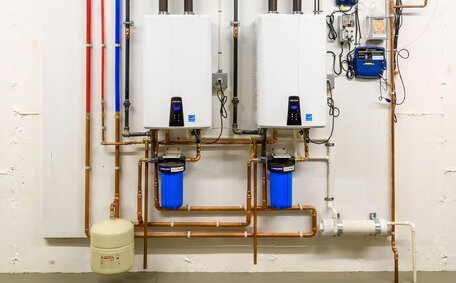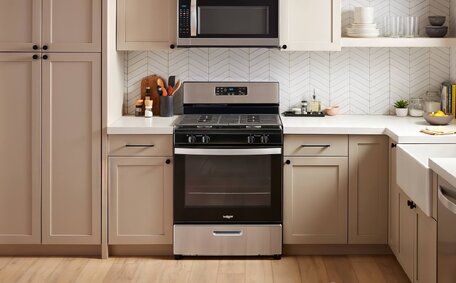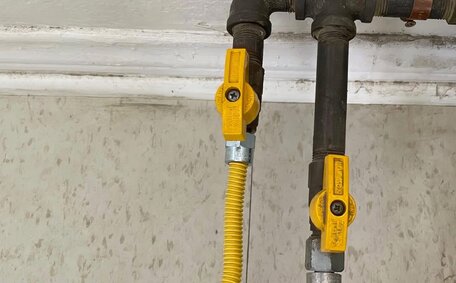
How Hard Water Hurts Hot Water Heaters
Hard water leaves mineral deposits in heaters, pipes and tanks. This limescale reduces efficiency, lifespan and hot water availability. Contact us for affordable water softening solutions.
Read MoreMaintaining clear drains in commercial kitchens and bar areas is crucial to prevent unpleasant odours, blockages, and health code violations in your dining space. Picnic Point Plumbing specialises in commercial drain maintenance for Sydney restaurants, ensuring smooth operations and prevention of plumbing issues.
Determining the extent of routine drain care is crucial for restaurants as grease, food remnants and other waste commonly clog drains. In time, accumulated matter leads to drain clogs and slow drainage, a challenge about restaurant operations must address. Kitchen staff must attentively monitor what goes down the sink, notably oils and grease, and diligently maintain grease traps.
Our blog examines a major drain issue facing restaurants and offers strategies to prevent blockages. Topics will include:
Adopting forward-thinking drain care best practices ensures that your establishment’s plumbing functions seamlessly, keeping your drains clean and letting you concentrate on serving your customers.
Fats, oils, and grease, collectively referred to as FOG, are the primary cause of kitchen drain blockages. When FOG washes water down sinks, it adheres to the inner walls of your pipes and solidifies, causing blockages, as drains can become severely clogged. Over time, FOG accumulation eventually obstructs water flow, causing sink backups, slow drainage, and necessitates comprehensive restaurant cleaning.
Incorporating drain grease trap apparatus is vital to intercept FOG before it integrates into your plumbing system. However, regular cleaning of grease traps, ideally weekly, is essential to avoid clogs. Failing to maintain grease trap cleanliness allows FOG to enter pipes, leading to major blockages.
A blockage in your restaurant drain due to FOG accumulation can wreak absolute havoc on the day-to-day operations. Without a working kitchen sink drain or drainage, your kitchen operations come to a standstill due to a clogged drain. Professional line jetting, a process that power-washes the accumulated grease, may be required to eliminate grease-induced clogs, though this can be costly and disruptive.
The best approach is diligent prevention. Following proper kitchen protocols, like scraping plates and discarding food waste before rinsing, can protect your restaurant drains from FOG and excess water. Comprehensive training of staff is crucial to maintain high standards of restaurant drain care, with an emphasis on the management of fats, grease, oils, and the water heater.
Ensuring the installation of appropriate traps and proper disposal of used cooking oil to confirm the effectiveness of drainage retention mechanisms is vital to prevent sink drain issues. Health regulations mandate weekly cleaning of traps to prevent clogs from accumulated grease. Overlooked traps permit FOG to travel and end up down your pipes where it adheres and can ultimately result in significant blockages.
We advise your restaurants to use drain screens on your garbage disposal units to efficiently trap food remnants. Screens stop solids from making their way into plumbing where clogs can cause issues down the line. Installing drain covers on floor sinks is advisable to block foreign objects from entering your drainage.
Along with grease traps and screens, restaurants need clear protocols to properly clean your food prep and cleanup areas. Scraping plates, disposing of waste correctly, and wiping spills before mopping all contribute to keeping drains unblocked. Educating your employees on daily conduct can prevent plumbing issues and goes a long way in adding to their understanding of their role in maintaining an efficacious plumbing system.
Proper disposal of grease and fat is essential to avoid blockages and ensure the clear flow through the restaurant’s drains. Use appropriate disposal units to prevent food scraps from entering the drains and follow with hot water to minimise residue build-up. Letting food particles flow water down drain invites the risk of gradual grease accumulation and subsequent blockages.
Educating staff on managing food waste, like thorough plate scraping, is key to preventing grease or fat from clogging drains. It’s also key to attach sink strainers to catch small bits and assess how often should they be cleaned to prevent issues. Any staff handling food prep should understand safe scrap disposal protocols.
Using bags specifically designed for food waste in rubbish bins is a practical approach to maintaining drains and streamlining transfer to external commercial bins. We recommend that you can take full bin bags to the bin at least once daily to control odours in the kitchen.
Diverting scrape waste helps prevent risks from bacterial accumulation in drains. To maintain your clean practices ensures food safety and hygiene standards are upheld across your restaurant.
Understanding how keep staff training and protocols updated, including keeping sink strainers clear, is vital for preventing plumbing disasters. This allows your team to keep service running smoothly.
Undertaking consistent cleaning maintenance is critical for restaurants, ensuring health standards are met and the drainage system can remain protected from any blockages. We recommend quarterly professional drain cleaning inspections to identify any developing issues. More frequent weekly and monthly tasks should also be scheduled for staff.
Utilise eco-friendly drain cleaning solutions weekly to dissolve grease and maintain clear water flow through pipes. Employ milder tactics to clear your drains and keep water clear and flowing, avoiding abrasive chemical cleaners that might degrade piping. A mix of boiling water and baking soda can gently but effectively cleanse away build-up, maintaining your plumbing’s hygiene.
A posted cleaning schedule can assist in maintaining clear drains and keeping staff informed of their responsibilities. Tasks like straining sinks, checking traps, and flushing drains keep your drains clear and prevent problems. Managers should monitor completion of these tasks daily.
Regular restaurant drain cleaning maintains plumbing efficiency and educates staff on proper practices. This proactive care stops issues before your restaurant faces disruptive drained pipe repairs or closures due to clogs violating health codes.
Even with diligent preventative maintenance, restaurants can encounter plumbing issues that exceed their internal capabilities. Knowing when to call in a plumber is crucial to avoid worsening plumbing problems.
Seeking expert assistance is wise when drains exhibit signs potentially damaging to your plumbing, such as:
Using store-bought drain cleaners to tackle severe clogs can actually exacerbate the issues. Engaging professional cleaning services with hydro jetting, camera inspections, and drain clearing equipment is often the safest bet.
Our licensed Sydney plumbing professionals can swiftly diagnose problems and apply specific solutions to restore drain flow. We know the intricate complexity of your drain system and have an arsenal of state-of-the-art tools to address stubborn clogs and backups.
If you suspect your restaurant has a serious drainage issue, call the drain restoration pros at Picnic Point Plumbing on 1300 349 338 or email jobs@picnicpointplumbingservices.com.au. We offer 24/7 emergency plumbing services, including CCTV drain surveys, to get water flowing in restaurants back up and running quickly.
Neglecting drain maintenance can lead to serious consequences for restaurants. Allowing issues like clogs, backups, and foul odours risks health code violations that can completely shut down operations.
Unmaintained drains can promote mould growth, which poses substantial health risks to guests and staff. Trying to power through plumbing issues instead of calling experts right away often worsens damage too.
Severely clogged pipes can require complete drain replacement. Store-bought cleaners can often eat through pipes, leading to more severe damage and necessitating professional interventions. Such scenarios result in costly services and repair downtime, potentially damaging your business’s finances and community reputation.
Proactive drain care safeguards assets and prevents service disruptions. It also demonstrates responsibility to health inspectors. But should disaster strike, Picnic Point Plumbing offers 24/7 emergency response to get restaurants running safely again.
Maintaining clear and odour-free drains should be a top priority for every restaurant. Implementing proactive drain care can help facilities avoid health code violations, business interruptions, expensive repairs, and reputational damage.
Implementing strict protocols for food scraps disposal, vigilant grease trap maintenance, sink strainer installation, and frequent professional inspections of drain grease is key. Comprehensive training focused on food preparation and staff adherence will help your establishment significantly in maintaining drain hygiene.
Should plumbing disasters strike despite best efforts, immediate expert help is critical. Contact the professional drain restoration team at Picnic Point Plumbing on 1300 349 338 or jobs@picnicpointplumbingservices.com.au for rapid response. We can quickly get restaurant operations smoothly running again.
Regular attention to daily drain care tasks helps prevent costly plumbing emergencies. A clean, clear drainage system avoids complete shutdowns so restaurants can maintain service excellence.
Hard water leaves mineral deposits in heaters, pipes and tanks. This limescale reduces efficiency, lifespan and hot water availability. Contact us for affordable water softening solutions.
Read MoreIt’s important to routinely check your gas appliances for any issues. Signs of problems include gas leaks, strange sounds, odd smells and more. Have a professional inspect your gas appliances annually and service them regularly for safety.
Read MoreUpgrading your gas meter is a simple process completed by registered technicians. It involves disconnecting your gas supply for 15 minutes to swap the old meter for a new digital smart meter. The upgrade is free and improves accuracy.
Read MorePicnic Point, 2213 NSW
We will call back as soon as possible.




